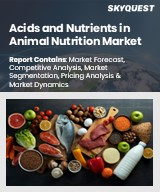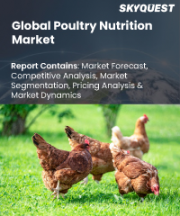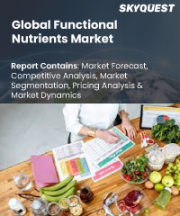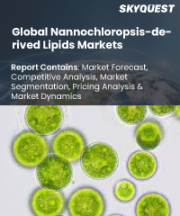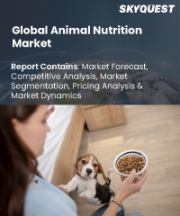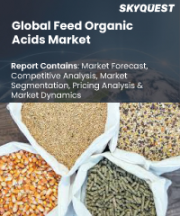
|
시장보고서
상품코드
1754011
동물 영양 화학제품 시장 보고서 : 제품 유형, 품종, 용도, 지역별(2025-2033년)Animal Nutrition Chemicals Market Report by Product Type, Species, Application, and Region 2025-2033 |
||||||
세계 동물 영양 화학제품 시장 규모는 2024년에 121억 달러에 달했습니다. 향후 IMARC Group은 2033년에는 184억 달러에 달할 것으로 예상되며, 2025년부터 2033년까지 4.56%의 연평균 성장률(CAGR)을 기록할 것으로 예측하고 있습니다.
동물 영양 화학제품은 동물의 성장을 촉진하고 건강을 유지하는 사료 첨가제 제품 및 보충제입니다. 사료 첨가제에는 사료 유인제, 면역 활성화제, 프리바이오틱스, 프로바이오틱스, 산미료, 에센셜 오일 등이 포함됩니다. 이들은 동물의 면역력, 번식력, 임신율, 신생아 생존율 및 성장, 육질, 사료 효율을 향상시키는 데 도움이 됩니다. 섭취, 흡수, 영양소 동화, 성장, 건강 증진에 도움이 됩니다. 또한 스트레스 저항 및 번식 등의 생리적 과정을 개선하는 데 도움이 됩니다. 그 결과, 동물 영양 화학제품은 최종 제품의 효능을 향상시키기 위해 사료 산업에서 널리 사용되고 있습니다.
동물 영양 화학제품 시장 동향:
급속한 도시화로 인해 전 세계적으로 가축이 크게 증가하고 가축의 건강 보험에 대한 요구가 증가하고 있는 것이 시장에 긍정적인 영향을 미치는 주요 요인 중 하나입니다. 반려동물 의료센터와 수의사의 확대, 가축의 치명적인 건강 문제 및 영양실조 위험 증가도 시장을 주도하고 있습니다. 또한, 개인의 구매력이 증가함에 따라 건강하고 영양가 높은 사료 첨가제에 돈을 쓸 수 있게 되었습니다. 이는 반려동물의 적절한 영양 섭취에 대한 개인의 인식 증가와 함께 동물 영양 화학제품에 대한 수요를 주도하고 있습니다. 이와는 별도로 육류 및 가금류 시장의 대폭적인 성장, 붉은 살코기 및 흰 살코기 소비 증가, 단백질이 풍부한 식단에 대한 수요 증가도 동물 영양 화학제품에 대한 수요를 촉진하는 요인입니다. 그 결과, 업계 투자자들에게 유리한 성장 기회를 제공하고 있습니다. 또한, 환경 친화적인 방법을 채택하고 천연 원료를 사용하여 제조업체가 제품 개발에 집중하는 경향이 증가하고 있으며, 이는 주요 플레이어에게 많은 기회를 제공 할 것으로 예상됩니다.
본 보고서에서 다루는 주요 질문
- 동물 영양 화학제품 세계 시장 규모는?
- 동물 영양 화학제품 세계 시장 성장률 전망(2025-2033년)은?
- 동물 영양 화학제품 세계 시장을 이끄는 주요 요인은 무엇인가?
- COVID-19가 세계 동물 영양 화학제품 시장에 미치는 영향은?
- 세계 동물 영양 화학제품 시장의 제품 유형별 분류는?
- 세계 동물 영양 화학제품 시장에서의 품종별 분류는 어떻게 되는가?
- 세계 동물 영양 화학제품 시장의 용도별 분류는?
- 동물 영양 화학제품 세계 시장 주요 지역은?
- 세계 동물 영양 화학제품 시장의 주요 기업은?
목차
제1장 서문
제2장 조사 범위와 조사 방법
- 조사 목적
- 이해관계자
- 데이터 소스
- 1차 정보
- 2차 정보
- 시장 추정
- 상향식 접근
- 하향식 접근
- 조사 방법
제3장 주요 요약
제4장 소개
- 개요
- 주요 업계 동향
제5장 세계의 동물 영양 화학제품 시장
- 시장 개요
- 시장 실적
- COVID-19의 영향
- 시장 예측
제6장 시장 내역 : 제품 유형별
- 아미노산
- 비타민
- 미네랄
- 효소
- 어유와 지질
- 카로티노이드
- 유바이오틱스
- 기타
제7장 시장 내역 : 품종별
- 가금
- 돼지
- 반추동물
- 반려동물
- 기타
제8장 시장 내역 : 용도별
- 동물용 식품 제조업체
- 농장용
- 가정용
- 수의용
- 기타
제9장 시장 내역 : 지역별
- 북미
- 미국
- 캐나다
- 아시아태평양
- 중국
- 일본
- 인도
- 한국
- 호주
- 인도네시아
- 기타
- 유럽
- 독일
- 프랑스
- 영국
- 이탈리아
- 스페인
- 러시아
- 기타
- 라틴아메리카
- 브라질
- 멕시코
- 기타
- 중동 및 아프리카
- 시장 내역 : 국가별
제10장 SWOT 분석
- 개요
- 강점
- 약점
- 기회
- 위협
제11장 밸류체인 분석
제12장 Porter's Five Forces 분석
- 개요
- 구매자의 교섭력
- 공급 기업의 교섭력
- 경쟁 정도
- 신규 참여업체의 위협
- 대체품의 위협
제13장 가격 분석
제14장 경쟁 구도
- 시장 구조
- 주요 기업
- 주요 기업 개요
- Aumgene Biosciences Pvt. Ltd.
- Balchem Corporation
- BASF SE
- Cargill Incorporated
- Evonik Industries AG(RAG-Stiftung)
- Kemin Industries Inc.
- Koninklijke DSM NV
- Novozymes A/S
- Tata Chemicals Limited
The global animal nutrition chemicals market size reached USD 12.1 Billion in 2024. Looking forward, IMARC Group expects the market to reach USD 18.4 Billion by 2033, exhibiting a growth rate (CAGR) of 4.56% during 2025-2033.
Animal nutrition chemicals are feed additive products or supplements that promote the growth of animals and maintain their health. They include feeding attractants, immunostimulants, prebiotics, probiotics, acidifiers, and essential oils. They help improve animal immunity, fertility, pregnancy outcome, newborn survival and growth, meat quality, and feed efficiency. They assist in promoting ingestion, absorption, assimilation of nutrients, growth, and health. Besides this, they aid in improving physiological processes, such as stress resistance and reproduction. As a result, animal nutrition chemicals are extensively utilized in the feed industry to improve the efficacy of the final product.
Animal Nutrition Chemicals Market Trends:
Rapid urbanization is leading to a significant increase in domesticated animals across the globe and the rising requirement for their health insurance represents one of the key factors positively influencing the market. The expansion of pet health care centers and veterinaries and the rising risk of deadly health issues and malnutrition among livestock are also driving the market. In addition, the increasing purchasing power of individuals is enabling them to spend on healthy and nutritious feed additives. This, in confluence with the rising awareness among individuals about proper pet nutrition, is driving the demand for animal nutrition chemicals. Apart from this, considerable development in the meat and poultry market and the increasing consumption of red and white meat, and the escalating demand for protein-rich diets are other factors propelling the need for animal nutrition chemicals. This, in turn, is offering lucrative growth opportunities to industry investors. Moreover, the rising focus of manufacturers on product development by adopting environment-friendly methods and using naturally derived feedstock is anticipated to provide numerous opportunities to key players.
Key Market Segmentation:
Breakup by Product Type:
- Amino Acid
- Vitamin
- Mineral
- Enzyme
- Fish Oil and Lipid
- Carotenoid
- Eubiotics
- Others
Breakup by Species:
- Poultry
- Swine
- Ruminant
- Pet
- Others
Breakup by Application:
- Animal Food Manufacturer
- Farm
- Household
- Veterinarian
- Others
Breakup by Region:
- North America
- United States
- Canada
- Asia-Pacific
- China
- Japan
- India
- South Korea
- Australia
- Indonesia
- Others
- Europe
- Germany
- France
- United Kingdom
- Italy
- Spain
- Russia
- Others
- Latin America
- Brazil
- Mexico
- Others
- Middle East and Africa
Competitive Landscape:
The competitive landscape of the industry has also been examined along with the profiles of the key players being Aumgene Biosciences Pvt. Ltd., Balchem Corporation, BASF SE, Cargill Incorporated, Evonik Industries AG (RAG-Stiftung), Kemin Industries Inc., Koninklijke DSM NV, Novozymes A/S and Tata Chemicals Limited.
Key Questions Answered in This Report
- 1.How big is the global animal nutrition chemicals market?
- 2.What is the expected growth rate of the global animal nutrition chemicals market during 2025-2033?
- 3.What are the key factors driving the global animal nutrition chemicals market?
- 4.What has been the impact of COVID-19 on the global animal nutrition chemicals market?
- 5.What is the breakup of the global animal nutrition chemicals market based on the product type?
- 6.What is the breakup of the global animal nutrition chemicals market based on the species?
- 7.What is the breakup of the global animal nutrition chemicals market based on the application?
- 8.What are the key regions in the global animal nutrition chemicals market?
- 9.Who are the key players/companies in the global animal nutrition chemicals market?
Table of Contents
1 Preface
2 Scope and Methodology
- 2.1 Objectives of the Study
- 2.2 Stakeholders
- 2.3 Data Sources
- 2.3.1 Primary Sources
- 2.3.2 Secondary Sources
- 2.4 Market Estimation
- 2.4.1 Bottom-Up Approach
- 2.4.2 Top-Down Approach
- 2.5 Forecasting Methodology
3 Executive Summary
4 Introduction
- 4.1 Overview
- 4.2 Key Industry Trends
5 Global Animal Nutrition Chemicals Market
- 5.1 Market Overview
- 5.2 Market Performance
- 5.3 Impact of COVID-19
- 5.4 Market Forecast
6 Market Breakup by Product Type
- 6.1 Amino Acid
- 6.1.1 Market Trends
- 6.1.2 Market Forecast
- 6.2 Vitamin
- 6.2.1 Market Trends
- 6.2.2 Market Forecast
- 6.3 Mineral
- 6.3.1 Market Trends
- 6.3.2 Market Forecast
- 6.4 Enzyme
- 6.4.1 Market Trends
- 6.4.2 Market Forecast
- 6.5 Fish Oil and Lipid
- 6.5.1 Market Trends
- 6.5.2 Market Forecast
- 6.6 Carotenoid
- 6.6.1 Market Trends
- 6.6.2 Market Forecast
- 6.7 Eubiotics
- 6.7.1 Market Trends
- 6.7.2 Market Forecast
- 6.8 Others
- 6.8.1 Market Trends
- 6.8.2 Market Forecast
7 Market Breakup by Species
- 7.1 Poultry
- 7.1.1 Market Trends
- 7.1.2 Market Forecast
- 7.2 Swine
- 7.2.1 Market Trends
- 7.2.2 Market Forecast
- 7.3 Ruminant
- 7.3.1 Market Trends
- 7.3.2 Market Forecast
- 7.4 Pet
- 7.4.1 Market Trends
- 7.4.2 Market Forecast
- 7.5 Others
- 7.5.1 Market Trends
- 7.5.2 Market Forecast
8 Market Breakup by Application
- 8.1 Animal Food Manufacturer
- 8.1.1 Market Trends
- 8.1.2 Market Forecast
- 8.2 Farm
- 8.2.1 Market Trends
- 8.2.2 Market Forecast
- 8.3 Household
- 8.3.1 Market Trends
- 8.3.2 Market Forecast
- 8.4 Veterinarian
- 8.4.1 Market Trends
- 8.4.2 Market Forecast
- 8.5 Others
- 8.5.1 Market Trends
- 8.5.2 Market Forecast
9 Market Breakup by Region
- 9.1 North America
- 9.1.1 United States
- 9.1.1.1 Market Trends
- 9.1.1.2 Market Forecast
- 9.1.2 Canada
- 9.1.2.1 Market Trends
- 9.1.2.2 Market Forecast
- 9.1.1 United States
- 9.2 Asia-Pacific
- 9.2.1 China
- 9.2.1.1 Market Trends
- 9.2.1.2 Market Forecast
- 9.2.2 Japan
- 9.2.2.1 Market Trends
- 9.2.2.2 Market Forecast
- 9.2.3 India
- 9.2.3.1 Market Trends
- 9.2.3.2 Market Forecast
- 9.2.4 South Korea
- 9.2.4.1 Market Trends
- 9.2.4.2 Market Forecast
- 9.2.5 Australia
- 9.2.5.1 Market Trends
- 9.2.5.2 Market Forecast
- 9.2.6 Indonesia
- 9.2.6.1 Market Trends
- 9.2.6.2 Market Forecast
- 9.2.7 Others
- 9.2.7.1 Market Trends
- 9.2.7.2 Market Forecast
- 9.2.1 China
- 9.3 Europe
- 9.3.1 Germany
- 9.3.1.1 Market Trends
- 9.3.1.2 Market Forecast
- 9.3.2 France
- 9.3.2.1 Market Trends
- 9.3.2.2 Market Forecast
- 9.3.3 United Kingdom
- 9.3.3.1 Market Trends
- 9.3.3.2 Market Forecast
- 9.3.4 Italy
- 9.3.4.1 Market Trends
- 9.3.4.2 Market Forecast
- 9.3.5 Spain
- 9.3.5.1 Market Trends
- 9.3.5.2 Market Forecast
- 9.3.6 Russia
- 9.3.6.1 Market Trends
- 9.3.6.2 Market Forecast
- 9.3.7 Others
- 9.3.7.1 Market Trends
- 9.3.7.2 Market Forecast
- 9.3.1 Germany
- 9.4 Latin America
- 9.4.1 Brazil
- 9.4.1.1 Market Trends
- 9.4.1.2 Market Forecast
- 9.4.2 Mexico
- 9.4.2.1 Market Trends
- 9.4.2.2 Market Forecast
- 9.4.3 Others
- 9.4.3.1 Market Trends
- 9.4.3.2 Market Forecast
- 9.4.1 Brazil
- 9.5 Middle East and Africa
- 9.5.1 Market Trends
- 9.5.2 Market Breakup by Country
- 9.5.3 Market Forecast
10 SWOT Analysis
- 10.1 Overview
- 10.2 Strengths
- 10.3 Weaknesses
- 10.4 Opportunities
- 10.5 Threats
11 Value Chain Analysis
12 Porters Five Forces Analysis
- 12.1 Overview
- 12.2 Bargaining Power of Buyers
- 12.3 Bargaining Power of Suppliers
- 12.4 Degree of Competition
- 12.5 Threat of New Entrants
- 12.6 Threat of Substitutes
13 Price Analysis
14 Competitive Landscape
- 14.1 Market Structure
- 14.2 Key Players
- 14.3 Profiles of Key Players
- 14.3.1 Aumgene Biosciences Pvt. Ltd.
- 14.3.1.1 Company Overview
- 14.3.1.2 Product Portfolio
- 14.3.2 Balchem Corporation
- 14.3.2.1 Company Overview
- 14.3.2.2 Product Portfolio
- 14.3.2.3 Financials
- 14.3.2.4 SWOT Analysis
- 14.3.3 BASF SE
- 14.3.3.1 Company Overview
- 14.3.3.2 Product Portfolio
- 14.3.3.3 Financials
- 14.3.3.4 SWOT Analysis
- 14.3.4 Cargill Incorporated
- 14.3.4.1 Company Overview
- 14.3.4.2 Product Portfolio
- 14.3.4.3 SWOT Analysis
- 14.3.5 Evonik Industries AG (RAG-Stiftung)
- 14.3.5.1 Company Overview
- 14.3.5.2 Product Portfolio
- 14.3.5.3 Financials
- 14.3.5.4 SWOT Analysis
- 14.3.6 Kemin Industries Inc.
- 14.3.6.1 Company Overview
- 14.3.6.2 Product Portfolio
- 14.3.7 Koninklijke DSM NV
- 14.3.7.1 Company Overview
- 14.3.7.2 Product Portfolio
- 14.3.7.3 Financials
- 14.3.7.4 SWOT Analysis
- 14.3.8 Novozymes A/S
- 14.3.8.1 Company Overview
- 14.3.8.2 Product Portfolio
- 14.3.8.3 Financials
- 14.3.8.4 SWOT Analysis
- 14.3.9 Tata Chemicals Limited
- 14.3.9.1 Company Overview
- 14.3.9.2 Product Portfolio
- 14.3.9.3 Financials
- 14.3.1 Aumgene Biosciences Pvt. Ltd.




